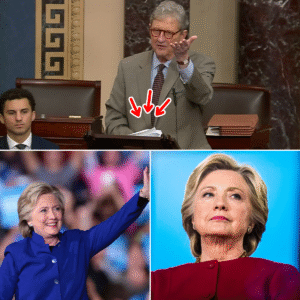
A new wave of social-media posts, political commentary videos, and online articles has reignited long-running controversy surrounding former Secretary of State Hillary Clinton. Headlines circulating across partisan platforms frame the issue in explosive terms — including phrases like “treason without end” and “forgotten evidence” — alleging that new material demands renewed legal scrutiny.
However, many of the claims being reshared are not based on newly discovered evidence, nor do they reflect any active legal proceedings. Still, the narrative has surged in popularity, fueled by election-year tensions, resurfaced partisan investigations, and the public’s enduring fascination with unresolved political disputes.
Here is what is actually happening — and why this narrative keeps returning.
The Viral Headline That Sparked the Latest Surge
The phrase “treason without end” has become a rallying cry in certain online circles, often attached to posts claiming that previously overlooked documents or testimonies implicate Clinton in wrongdoing tied to foreign policy, intelligence matters, or political strategy.
These narratives generally originate from:
-
Clips of older congressional hearings
-
Speculative commentary on partisan podcasts
-
Reinterpretation of past investigations
-
Repackaged content from years-old reports
Despite their dramatic presentation, none of the circulating posts cite new evidence, new charges, or new investigations.
Yet the rhetoric surrounding “forgotten evidence” continues to gain traction.
Why the Clinton Debate Never Fully Disappears
Hillary Clinton remains one of the most discussed political figures of the last three decades. To supporters, she symbolizes resilience and experience. To critics, she represents institutional power, political secrecy, and partisan distrust.
Three factors keep these narratives alive:
1. High Polarization and Partisan Memory
Stories involving Clinton — whether about emails, Benghazi, or internal DNC disputes — often become shorthand for broader debates about government transparency and elite accountability.
2. Election-Year Weaponization
Political figures from both parties frequently reference past controversies for strategic gain, especially when public attention shifts toward national security or foreign affairs.
3. Enduring Public Uncertainty
Even after multiple official investigations (including bipartisan committees, Inspector General reviews, and FBI statements), many Americans still feel unclear about what happened — creating a vacuum that viral posts easily fill.
What Investigations Have Actually Said
Over the years, several high-profile inquiries have examined various Clinton-related controversies. Their findings include:
-
FBI investigations, which did not recommend criminal charges
-
State Department reviews, which criticized internal processes but did not assign criminal liability
-
Bipartisan congressional committees, which identified leadership failures in areas like security but found no evidence of treason or criminal intent
The phrase “no statute of limitations” often appears in political headlines, but legally, most accusations circulated online either do not meet the definition of treason or relate to matters already examined under proper constitutional procedures.
Why the “Forgotten Evidence” Narrative Still Spreads
Political analysts say the latest wave of posts is less about new information and more about:
-
Public mistrust of institutions
-
The emotional power of unresolved political grievances
-
The revival of old footage framed as new
-
The rise of algorithm-driven outrage content
In today’s media ecosystem, a dramatic claim — even without supporting data — can reach millions in hours.
The Real Impact: Public Perception, Not Legal Proceedings
Despite the sweeping language used in viral posts, there is no credible sign of new charges, new investigations, or reopened cases involving Hillary Clinton. Legal experts emphasize that treason is one of the most narrowly defined crimes in U.S. law, and none of the widely circulated allegations meet that standard.
But the political impact is undeniable. The narrative influences:
-
Voter sentiment
-
Social-media discourse
-
Partisan messaging
-
Trust in institutions
The resurfacing of these claims reveals ongoing national divisions — not new developments in the justice system.
Conclusion: A Story About American Politics, Not New Evidence
The phrase “treason without end” captures the intensity of today’s political climate — a climate where old controversies can feel new again, and where emotionally charged narratives often overshadow official findings.
While the viral headlines suggest seismic revelations, current facts indicate something far different:
a powerful resurgence of long-standing political grievances, not newly uncovered wrongdoing.
As the story continues to circulate, one truth is clear: the debate surrounding Hillary Clinton isn’t about to end — not because of new evidence, but because of the country’s unresolved political divides.





